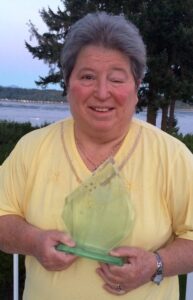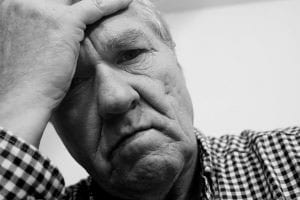Jean’s life story is one of extraordinary resilience, a testament to the strength of the human spirit in the face of rare and challenging medical conditions. Born in 1943 in the Scottish town of Oban, Jean has navigated a complex web of health challenges, each one more daunting than the last, but always met with the same unwavering determination. As both a patient and an advocate, she has not only fought for her own well-being but has worked tirelessly to help others who face similar struggles. Her journey is a powerful reminder that, no matter the adversity, the will to live and advocate can be a source of incredible strength.
Waardenburg Syndrome: A Rare Genetic Condition
Jean’s story begins with Waardenburg syndrome, a rare genetic condition that affects both hearing and vision. For Jean, this condition manifests in a particularly unique way: ptosis, or drooping eyelids, in her left eye. While this can usually be corrected through surgery, Jean’s case is more complicated. Despite attempts to lift the eyelid, it refuses to stay up, creating a persistent issue. Her left eye remains a challenge, offering only a “warning” of vision—enough to indicate something is there but not enough to give her clear sight. When Jean looks right, her eyelid opens, but the vision she gains is limited, and when she looks left, she sees nothing at all.
The hearing loss associated with Waardenburg syndrome is also severe to profound, affecting both ears. Jean’s mother had similar hearing loss, as well as distinct eye coloring—one brown and one clear blue—which further solidified the diagnosis of Waardenburg syndrome in Jean. Despite these challenges, Jean’s mother was an incredibly strong figure, earning an honors BSc and working as a nutrition advisor to soldiers returning from World War II. Jean’s mother’s resilience served as an early model for the strength Jean would need in her own life.
Mitochondrial Disease: A Hidden Challenge
In addition to Waardenburg syndrome, Jean has mitochondrial disease, a condition that disrupts the energy production in her cells. This disease is notoriously difficult to diagnose and even harder to treat, as it affects various systems in the body, leading to a wide array of symptoms. Mitochondrial disease can cause muscle weakness, fatigue, and other debilitating issues that often worsen over time. For Jean, the disease has been part of her life’s journey, impacting her physical stamina and requiring adaptations to her daily routine. She uses a power-assisted wheelchair to help with mobility, relying on it for independence while managing the effects of this chronic illness.
Despite the challenges, Jean refuses to let mitochondrial disease define her. She continues to live her life with a spirit of perseverance, finding ways to advocate for both herself and others facing similar struggles. Her passion for helping others has made her an advocate for those with rare diseases, working to raise awareness and provide support to those who feel isolated by their conditions.
Familial ALS (SOD1): A Legacy of Courage
Jean’s family has also been affected by another rare condition: the familial form of amyotrophic lateral sclerosis (ALS), specifically the SOD1 mutation. Jean’s diagnoses were done by an organization in the US from a blood sample. They did blood samples of son John (elder twin by 7.5 minutes). They both had SOD1 diagnoses AND Waardenburg Syndrome type 4a. ALS is a neurodegenerative disease that progressively weakens muscles and impairs physical function, eventually leading to paralysis. The SOD1 mutation, which is inherited, has passed through generations of Jean’s family, leaving its mark. Jean’s children, identical twins now in their 60s, inherited the Waardenburg syndrome from her, though one of them has a particularly striking feature: a small blue sliver in one eye, along with a partial blue eye on the other.
While Jean has not been diagnosed with ALS herself, the familial legacy of the condition is a constant reminder of the challenges that genetic diseases can bring to a family. Jean’s ability to remain strong in the face of her own medical conditions, while simultaneously supporting her children through their own health challenges, is a testament to her resilience.
Daily Life and Advocacy: A Model of Strength
Jean’s daily life is filled with small victories that, when taken together, reveal an astonishing level of strength. Despite the challenges of her conditions, Jean maintains a routine. She starts her day by showering, having breakfast, and taking her beloved yellow Labrador, Honey, on a walk. Though the weather often determines the length of the walk, it’s clear that these moments of connection with nature and her dog are essential to her well-being. Honey, known for her quiet demeanor and friendly nature, is a loyal companion who helps Jean maintain a sense of normalcy in a life that has, at times, been anything but ordinary.
At just 4 feet 10 inches tall, Jean often jokes that her height is a reflection of her Pictish heritage—a small, resilient people known for their strength. And indeed, Jean’s own resilience shines through in the way she navigates her complex health landscape. She faces the possibility of needing further back surgery—another hurdle that, for now, is delayed by her inability to drive and access the necessary medical care. Yet, she approaches this challenge with the same determination that has carried her through so much. She has learned to adapt, to rely on the support of her power-assisted wheelchair, and to find joy in the simple things, like her morning walks with Honey.
An Advocate for Others
Jean is not only a patient; she is a fierce advocate. With a deep understanding of her own conditions, she works to help others who are affected by rare diseases like mitochondrial disease, Waardenburg syndrome, and ALS. She recognizes that many healthcare providers have only basic knowledge of mitochondrial function, and she uses her voice to raise awareness and push for more research and better care. Her advocacy is not just about her own needs—it’s about creating a community where others facing similar struggles can find support, information, and hope.
Jean’s twin children are part of this ongoing legacy of advocacy. Despite inheriting Waardenburg syndrome, they, too, are living full lives, shaped by their mother’s strength and determination. Jean’s ability to provide not only care but also a model of resilience to her family and others is a testament to the power of advocacy and support in the face of chronic illness.
Jean’s life story is a powerful reminder that, even in the face of rare and difficult conditions, the human spirit is capable of incredible strength. Through her own trials with Waardenburg syndrome, mitochondrial disease, and the familial form of ALS, Jean has shown that resilience is not just about enduring; it’s about thriving, advocating, and helping others find their own strength. Her journey is an inspiration to all who face similar challenges, and a beacon of hope for those navigating the complex world of rare diseases.









